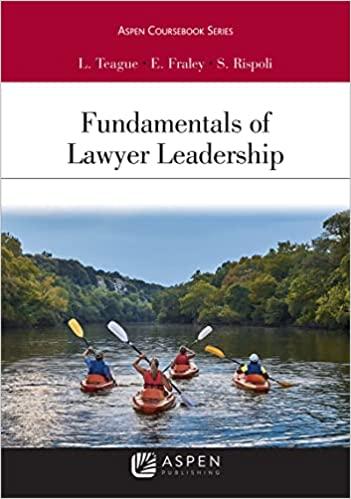Question
Case Study Analysis - Using the IRAC Method Facts Even if you are not required to submit a list of facts in your answer, it
Case Study Analysis - Using the IRAC Method
Facts
Even if you are not required
to submit a list of facts in your answer, it is a good idea to write one. This
will help you sort through the facts you have been given and determine which
facts are relevant and how you are going to use them. The following is a list
of questions that may help you do this Who is involved? (identify parties
specifically by name, if possible)
Who suffered?
How?
Why? (was is avoidable?)
What is the known
(relevant) information?
Is there any missing
information?
Include specific details
like dates and monetary figures
Note:
Reread the question at the
end of the case study. This will tell you what you are supposed to be doing and
it will help you determine which facts are relevant.
Issues
Identify the problem: what
has gone wrong and for whom?
Name each Plaintiff and
Defendant and briefly describe their individual issues
Work out what area of law
may govern the resolution of the problem.
This could include, but is
not limited to the following bodies of law
o Contract law (be specific about which part)
o Trade practices (e.g. misleading conduct)
o A company law issue (e.g. breach of director's duty)
o Negligence Criminal Law
o Constitutional Law
o Partnership Law
Assignments generally
relate to one area of law but the assignment will usually raise a number of
issues within that general area.
Identify any conflicting or
troublesome facts
Note:
Assessment tasks are set
around the work that you have done in class or will do in class. You are not
expected to go outside the content of the unit but you are expected to explore
it
Rules
and relevant Law
Set out the legal
principles that will be used to address the problem.
Source legal principles
from cases and legislation.
Note: Make
sure you are specific when stating the relevant law/rules that apply, and
always make sure to support propositions with case authority.
Analysis
Explain in detail why the
Plaintiff's claims are (or are not) justified, based on the body of law
pertaining to the case.
How will this law be used
by each party to argue their case?
Use relevant precedent
cases or Legal Principles to support each answer.
You may also choose to use
Legislation, when applicable.
There are often several
Plaintiffs involved. Take the time to examine each case individually and
analyse why their claims are (or are not) valid.
Legal Principals and
precedent cases are used in each analysis, even if there is overlap among
Plaintiffs (the same precedent can be applied to both parties, if appropriate.
See example 2).
It is acceptable to refer
the reader to another point in the paper, rather than rewriting it word for
word, if the situation calls for the same legal recommendation. (See example 1
and 2)
Note:
Take time to discuss the contentious aspects of the case rather
than the ones that are most comfortable or obvious.
Conclusion
Stand back and play 'the
judge.'
Choose the argument you
think is the strongest and articulate what you believe to be the appropriate
answer.
State who is liable for
what and to what extent.
Consider how parties could
have acted to better manage their risks in order to avoid this legal problem
Instructions
Complete BOTH mini cases
provided to you.
Your assignment must be
analysed and written using IRAC Method.
Information found and used
from website, magazines, journals, books or text book etc. must be properly
reference in the body of your assignment and in your reference list or
bibliography
Mini Case #2
Bento Flex Ltd. v. Jones
[2004] Marvin A. Jones was the operator of an ice-resurfacing machine and was
filling it with water when an explosion injured him. The water tank and the
gasoline tank were similar and located in close proximity and he made the
mistake of filling the gasoline tank with water from a hose. When the water
filled the tank, the gasoline escaped and an overhead heater ignited the
resulting fumes. He sued the manufacturer and distributor of the machine for
negligence.
A. Explain the arguments
available on both sides and the likely outcome including the calculation of
damages, if appropriate. Would it make any difference to your answer to know
that Jones testified that the two tanks did not confuse him?
Step by Step Solution
There are 3 Steps involved in it
Step: 1

Get Instant Access to Expert-Tailored Solutions
See step-by-step solutions with expert insights and AI powered tools for academic success
Step: 2

Step: 3

Ace Your Homework with AI
Get the answers you need in no time with our AI-driven, step-by-step assistance
Get Started


